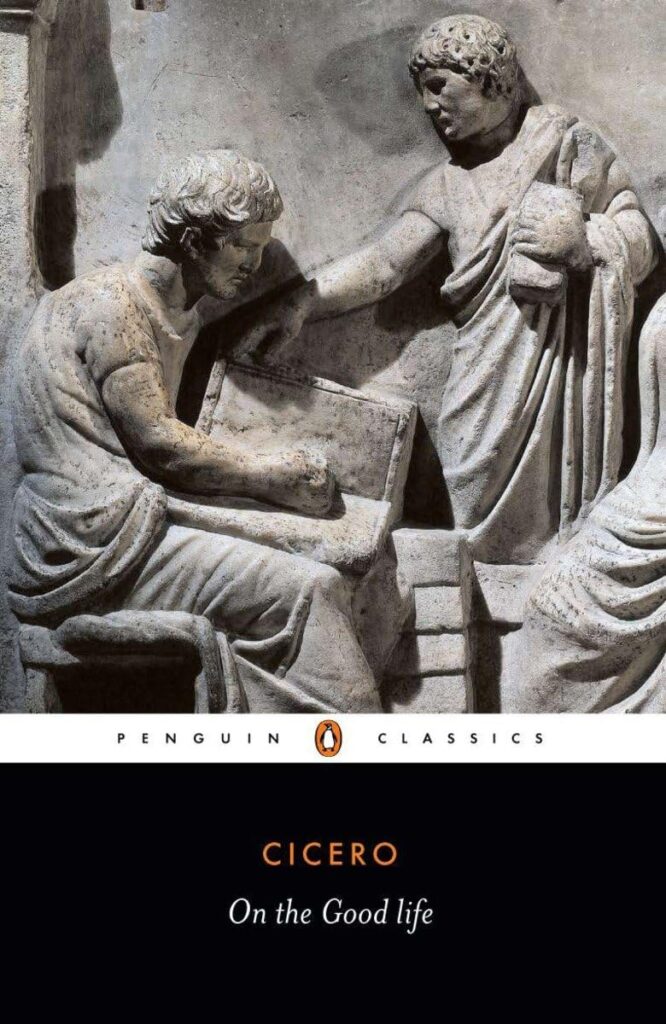What does it mean to live a good life? Right… It’s one of those questions that you don’t just answer. It’s something you feel in your bones, something you’re always chasing—like a half-forgotten melody you can’t quite hum. And maybe that’s why Marcus Tullius Cicero’s works on the good life have stuck around through centuries. There’s something timeless and piercing about the way he frames it.
Table of Contents
Isn’t Happiness Subjective?
Here’s where Cicero hits differently than modern self-help. He doesn’t entertain the idea that what makes someone happy is always “their own truth.” No, Cicero saw happiness as a byproduct of a much deeper, universal truth: virtue.
Yeah, I know what you’re thinking: “Virtue? Sounds churchy.” But hear me out. For Cicero, virtue wasn’t some high-horse moralizing. It was about aligning character with reason and justice—inward balance radiating outward into relationships, society, and the messy, beautiful web of life.
Can you imagine what Cicero would say about today’s YOLO culture? Probably something like: Sure, live once, but don’t waste that life chasing instant gratification. Because his roadmap? It’s about deeper investments—stability, discipline, and acting with dignity (even when it’s hard).
If you’re curious about diving deeper into Cicero’s teachings, his books such as On the Good Life (Penguin Classics) are incredibly enlightening.
The Role of Friendship
You ever notice how loneliness feels heavier than almost any other emotion? That’s no accident. Cicero once said that life without friendship is like the sky without its sun. (Okay, I paraphrased, but you get it.)
Friendship, to Cicero, wasn’t just hanging out or keeping people around for convenience. Friendship was sacred––a bond built on mutual virtue. Not transactional, not Instagram likes. He believed these connections were rare, hard to come by, but once fostered, they were life’s sweetest gift.
And it’s funny—his thoughts on this seem more relevant now than ever in an era of endless “followers” and fleeting interactions. He reminds me that the good life isn’t measured in numbers but in meaning.
Want to explore more about what Cicero prized? Goodreads hosts some incredible discussions on his ideas about friendship and duty.
Material Wealth: A False God
Another thing people get wrong? The obsession with wealth. Pop culture glamorizes it (cue the mansions, sports cars, champagne towers). But Cicero dismantled the illusion in a jaw-droppingly simple way.
According to him, wealth might ease material burdens, but it doesn’t cure an anxious mind or an insatiable soul. The kind of richness he espoused came from cultivating virtues—wisdom, courage, temperance, justice.
It’s ironic, isn’t it? We spend so much time chasing “success,” only to sometimes feel more empty when we get there. And Cicero, in all his ancient genius, whispered something so simple: Money’s a tool, not the purpose. If you want more on his writings dissecting these very themes, this archive on Cicero’s works might be a treasure trove for you.
But What About Struggles?
Ah, here’s the thing: even Cicero’s “good life” wasn’t immune to storms and chaos. Which is both comforting and frustrating, isn’t it? He was painfully aware of life’s fragility. (He’d witnessed his fair share of betrayals, wars, and losses in Rome. Like, picture Julius Caesar-level drama.)
But Cicero’s resilience came from seeking meaning in the right places. For him, the good life wasn’t about dodging struggles, but facing them with integrity. Think of it like weightlifting—strain builds muscle. In Cicero’s philosophy, hardship builds character.
You could say he was ahead of his time here, aligning with more modern sentiments on growth through adversity. If this intrigues you, Penguin Random House’s edition has a way of pulling it all together for modern readers.
The Legacy of a Thought
What I can’t shake off about Cicero is how raw his ideas still are. They feel so … counterintuitive in today’s world of quick fixes and instant pleasure. It’s like we’ve got all these gadgets and shortcuts, but the human heart hasn’t evolved past its ancient needs. We still crave purpose, virtue, connection.
And Cicero? He feels like that old friend nudging us toward deep waters when we’re content paddling in puddles. His works may take some effort to chew through, but trust me—it’s the kind of effort that lingers long after.
For instance, On the Good Life isn’t just about dogma; it’s contemplative, open-ended. It invites us to wrestle with our priorities. Sobrief’s breakdown is a good jumping-off point if you want a mix of quotes, summaries, and modern applications.
A Final Word (Or Two…)
In trying to live the “good life,” I wonder: are we asking the wrong questions? Maybe it’s not about what we want, but about who we’re becoming.
In Cicero’s words, I think there’s a quiet revolution waiting to happen in any of us willing to listen. It’s not easy—it requires patience, self-reflection, and sometimes discomfort—but isn’t that what makes it worth pursuing?
Look, tomorrow might throw curveballs. But tonight, I’m holding tight to the idea that goodness—true goodness—isn’t about what I own, what I achieve, or who approves of me. It’s about what I bring to the table when no one’s looking.
—End scene.
And now… you? What are you doing to cultivate goodness in your life? And no pressure—I’m still figuring it out too.

